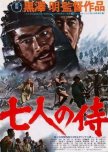As a lover of classic movies, I consider "Samurai Seven" one of the most highly acclaimed films of its time. Even now, the black and white production is appreciated by modern-day viewers and revered by contemporary movie directors alike.
The movie takes place near the end of the Sengoku era; possibly the Azuchi-Momoyama period. Due to political unrest and military wars, there are plenty of ronin samurai roaming about, but there are also bandits. The latter terrorize local villages; simple farmers are robbed of their meager possessions, their harvest and their women. Undoubtedly, the farmers are forced to make a decision; they can either allow things to continue as is or... make a stand to fight and defend what is theirs. The villagers choose to fight back, but they are farmers, not warriors. They have no training in weaponry and they lack the necessary skills for battle. Therefore, they come up with a plan to hire ronin samurai to aid them in their fight to be free of oppression.
But, what does an impoverished village have to offer? Practically nothing, except the rice they have nurtured and grown all winter. Thus... their quest begins. A quest to find hungry samurai who will work for three square meals a day, instead of money.
Ultimately, the villagers are left feeling despondent, as their primary efforts appear futile. However, eventually they are able to procure five highly skilled samurai and two promising hopefuls.
I enjoyed each samurai character. Separate entities, different personalties and each had their own personal reasons for aiding the farmers. I, however, felt those reasons were vague and not clearly expressed in the movie, yet it enabled the viewing audience to reflect and draw their own conclusions. The animated series of Samurai Seven, I feel evoked more feeling into its samurai characters than the screen version.
Throughout the film, I found myself drawn to each samurai, as well as sympathizing the plight of the villagers. How could one not respect the efforts of Kambei Shimada (portrayed by actor - Takashi Shimura). He was the first to accept the villagers offer and began overseeing the recruitment of more samurai to the cause.
The skilled swordsman, Kyuzo (actor - Seiji Miyaguchi); even though his dialogue was minimal, I found him equally impressive. His stoic, no-nonsense character was one to get the job done with no questions asked.
Of all the seven, none compared to Kikuchiyo (actor - Toshiro Mifune). To me, his performance stole the show. Kikuchiyo's passioned speeches chastised both the samurai and the farmers, but it opened the door for acknowledgement of their differences and brought about an understanding of the two separate classes. Mifune's comedic antics kept the dire situation from becoming too solemn, thus uplifting the villagers spirits, as well as, entertaining an audience.
This classic is enriched with meaning; it also portrays both the social and economic history of feudal Japan in grave detail. Ultimately, Samurai Seven is a film that will stand the test of time. If you haven't seen it, then I highly recommend that you do.
The movie takes place near the end of the Sengoku era; possibly the Azuchi-Momoyama period. Due to political unrest and military wars, there are plenty of ronin samurai roaming about, but there are also bandits. The latter terrorize local villages; simple farmers are robbed of their meager possessions, their harvest and their women. Undoubtedly, the farmers are forced to make a decision; they can either allow things to continue as is or... make a stand to fight and defend what is theirs. The villagers choose to fight back, but they are farmers, not warriors. They have no training in weaponry and they lack the necessary skills for battle. Therefore, they come up with a plan to hire ronin samurai to aid them in their fight to be free of oppression.
But, what does an impoverished village have to offer? Practically nothing, except the rice they have nurtured and grown all winter. Thus... their quest begins. A quest to find hungry samurai who will work for three square meals a day, instead of money.
Ultimately, the villagers are left feeling despondent, as their primary efforts appear futile. However, eventually they are able to procure five highly skilled samurai and two promising hopefuls.
I enjoyed each samurai character. Separate entities, different personalties and each had their own personal reasons for aiding the farmers. I, however, felt those reasons were vague and not clearly expressed in the movie, yet it enabled the viewing audience to reflect and draw their own conclusions. The animated series of Samurai Seven, I feel evoked more feeling into its samurai characters than the screen version.
Throughout the film, I found myself drawn to each samurai, as well as sympathizing the plight of the villagers. How could one not respect the efforts of Kambei Shimada (portrayed by actor - Takashi Shimura). He was the first to accept the villagers offer and began overseeing the recruitment of more samurai to the cause.
The skilled swordsman, Kyuzo (actor - Seiji Miyaguchi); even though his dialogue was minimal, I found him equally impressive. His stoic, no-nonsense character was one to get the job done with no questions asked.
Of all the seven, none compared to Kikuchiyo (actor - Toshiro Mifune). To me, his performance stole the show. Kikuchiyo's passioned speeches chastised both the samurai and the farmers, but it opened the door for acknowledgement of their differences and brought about an understanding of the two separate classes. Mifune's comedic antics kept the dire situation from becoming too solemn, thus uplifting the villagers spirits, as well as, entertaining an audience.
This classic is enriched with meaning; it also portrays both the social and economic history of feudal Japan in grave detail. Ultimately, Samurai Seven is a film that will stand the test of time. If you haven't seen it, then I highly recommend that you do.
Was this review helpful to you?


























